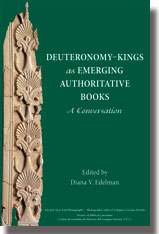
$51.00
Explore how the past came to address the present and the future and why it became important for emerging Jewish identity.
Experts explore the themes and topics that made Deuteronomy and the Former Prophets appealing to ancient readers leading ultimately to those texts becoming authoritative for Persian and Hellenistic readers. This unique collection of essays focuses on what larger impact these texts might have had on primary and secondary audiences as part of emerging Torah. Contributors include Klaus-Peter Adam, Yairah Amit, Thomas M. Bolin, Philip R. Davies, Serge Frolov, Susanne Gilmayr-Bucher, E. Axel Knauf, Christoph Levin, James R. Linville, and Thomas Römer, and Diana V. Edelman.
Features:
- Essays focused on why texts became authoritative instead of when they were written or their historicity
- Two scholars examine each book providing a range of views
- Coverage of the socio-religious function of emerging Torah in the Persian and early Hellenistic periods
Diana V. Edelman is a Research Associate in the Department of Near and Middle East Studies, Trinity College, Dublin, interested in the history, archaeology, and literature of the ancient southern Levant. She is the co-author of Opening the Books of Moses (Equinox, 2012) and co-editor of a number of books, including What Was Authoritative for Chronicles? (Eisenbrauns, 2011) and Remembering Biblical Figures in the Late Persian and Early Hellenistic Periods: Social Memory and Imagination (Oxford University Press, 2013).
Download a printable publication sheet that you can put in your files or give to your librarian or bookstore.
Download volume front matter, including table of contents and introduction.
Download a printable standing order sheet to see other available volumes in the series and to give to your librarian to set up a standing order.
